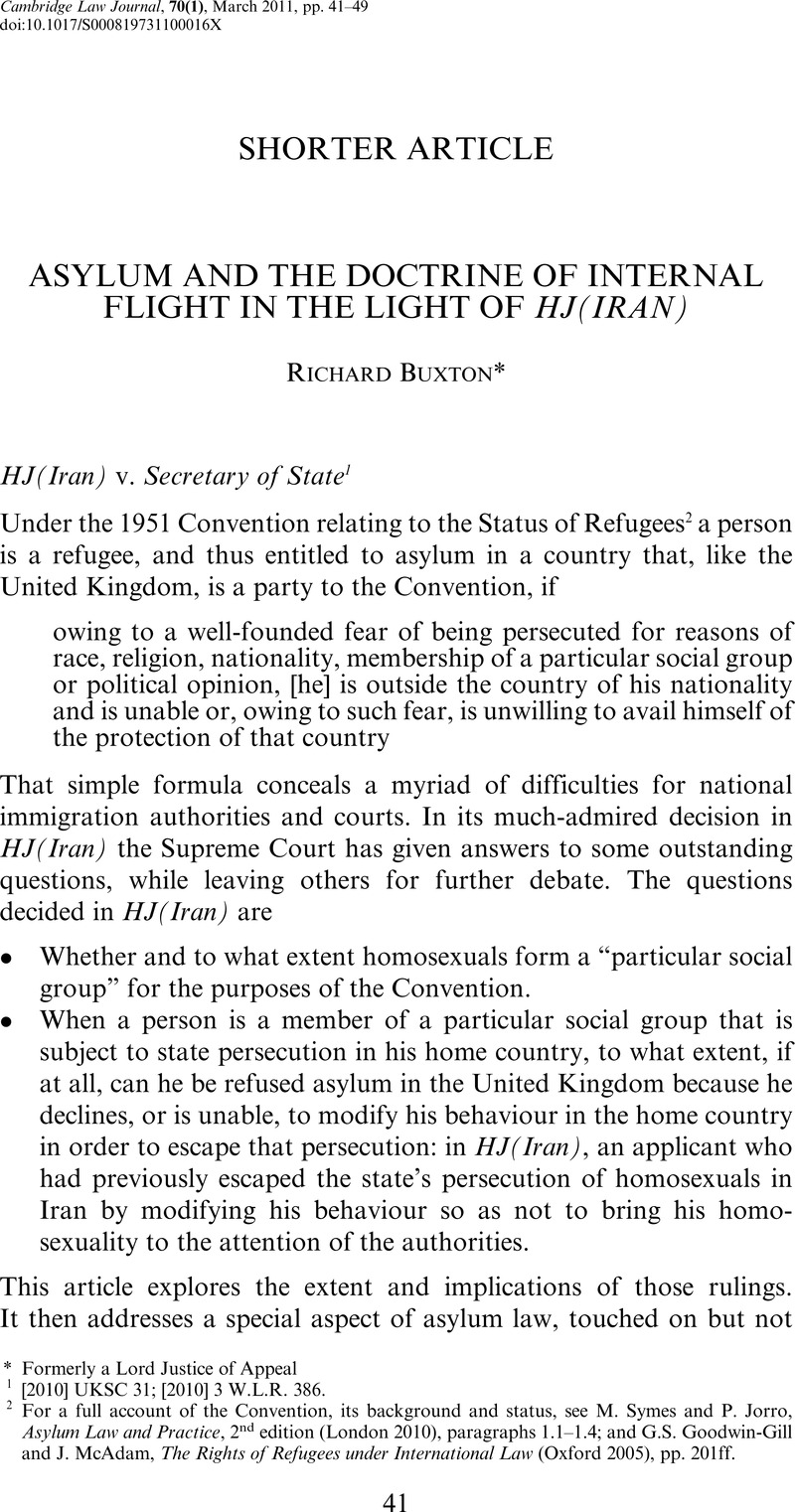No CrossRef data available.
Article contents
ASYLUM AND THE DOCTRINE OF INTERNAL FLIGHT IN THE LIGHT OF HJ(IRAN)
Published online by Cambridge University Press: 15 March 2011
Abstract

- Type
- Shorter Articles
- Information
- Copyright
- Copyright © Cambridge Law Journal and Contributors 2011
References
1 [2010] UKSC 31; [2010] 3 W.L.R. 386.
2 For a full account of the Convention, its background and status, see M. Symes and P. Jorro, Asylum Law and Practice, 2nd edition (London 2010), paragraphs 1.1–1.4; and G.S. Goodwin-Gill and J. McAdam, The Rights of Refugees under International Law (Oxford 2005), pp. 201ff.
3 HJ(Iran) at paragraph 10. This analysis lays to rest the possibility suggested by, e.g., Symes and Jorro, op cit at paragraph 3.31, that protection of homosexuals depended on privacy rights, and therefore only extended to conduct in private.
4 As Lord Hope of Craighead DPSC puts it in paragraph 3 of HJ(Iran), homosexuals are entitled to no more protection (though certainly no less protection) than other persecuted groups.
5 HJ(Iran) at paragraph 78.
6 Ibid., at paragraph 81.
7 [2005] INLR 68[120].
8 Paragraph 114 may have misled Elias L.J. in his (obiter) remarks in TM(Zimbabwe) and others v SSHD [2010] EWCA Civ 916[41] into suggesting that applicants for asylum might be expected to modify their behaviour in respect of “marginal” as opposed to “crucial” aspects of their beliefs. The distinction suggested by Elias L.J. was rejected by the Court of Appeal in RT (Zimbabwe) and others v SSHD [2010] EWCA Civ 1285[35].
9 [2007] Imm. A.R. 73.
10 [2005] Imm. A.R. 75.
11 [2005] Imm. A.R. 75[16]. The reference is to Ahmed v Secretary of State [2000] I.N.L.R. 1, a case on political opinion that was specifically approved by the Supreme Court in HJ(Iran), for instance by Lord Hope of Craighead DPSC at paragraph 18 of the report.
12 [2005] Imm. A.R. 75[15].
13 [2003] 1 W.L.R. 856.
14 At paragraph 14. See also Lord Walker of Gestingthorpe JSC at paragraph 95 of HJ(Iran), who found the description of the nature of persecution in Appellant S395/2002 to be “unexceptionable”.
15 HJ(Iran) at paragraph 29.
16 It is of some interest that that was the understanding of the then current authority that was expressed by the (expert) AIT in its determination in HJ(Iran). As Lord Hope of Craighead DPSC reports at paragraph 37 of HJ(Iran): “Applying the guidance in J v Secretary of State for the Home Department [2007] Imm. A.R. 73 to HJ's case, the Asylum and Immigration Tribunal said that the issue was whether the need for him to live discreetly would itself constitute persecution.”
17 HJ(Iran) at paragraph 103.
18 It was failure to appreciate that the test applied by the Court of Appeal was the Convention test for persecution that led the Supreme Court to say that the Court of Appeal's test was vague and uncertain: see per Lord Rodger of Earlsferry JSC at paragraph 80, and Dyson JSC at paragraph 121 (“vague and difficult to apply”). Since it is the same test as the test to determine the original state of persecution that the Supreme Court drew from Appellant 395/202, it cannot be any vaguer or more difficult to apply than is the initial question of whether the applicant was a member of a group that had a well-founded fear of persecution in the home country.
19 It is not necessary to stress that none of this analysis seeks to undervalue the dire situation in which homosexuals in Iran can find themselves: see for instance “Ebrahim Hamidi a 18 ans et il va être pendu”, Le Monde, 1 September 2010, p. 15. According to the report, Hamidi falsely confessed to homosexual conduct under torture, and after a trial in which he did not have legal representation. But it does not follow even from such events that all homosexuals from Iran, irrespective of the nature of their avoiding behaviour, are necessarily entitled to asylum.
20 [2005] EWCA Civ 711; [2005] I.N.L.R. 602.
21 This is the effect of the decision of the Court of Appeal in the first case to apply HJ(Iran), RT(Zimbabwe) and others v SSHD [2010] EWCA Civ 1285[36]–[37]. The case concerned the requirement for citizens returning to Zimbabwe to demonstrate loyalty to the ruling Zanu-PF party if they were to escape persecution.
22 For a lengthy exposition, with ample verbatim citation of authority, see Symes and Jorro, op. cit., paragraphs 5.11–5.22. The learned authors express a less critical view of the current English law than does the present writer.
23 [2006] UKHL 5; [2006] 2 AC 426.
24 Pace Lord Hope of Craighead in Januzi [2006] 2 AC 426[47] and Lord Brown of Eaton-under-Heywood in AH(Iran) [2008] 1 AC 678[40], it is not easy to reconcile that standard with the approach stated by the UNHCR in paragraph 7 II (a) of its 2003 Guidelines on Internal Relocation: “can the claimant in the context of the country concerned lead a relatively normal life without facing undue hardship?”
25 [2007] UKHL 49; [2008] 1 AC 678.
26 Again, compare the UNHCR Guidelines, paragraph 30 of which states that “A person should also not be required to locate to areas, such as the slums of an urban area, where they will be required to live in conditions of severe hardship”.
27 HJ(Iran) at paragraph 21.


